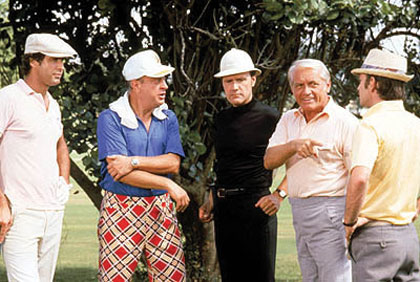How Executives Can Make Bad Decisions
Social networks provide greater access to information, which improves people’s judgment and decision making, right? Not always, according to some recent research.
Topics

A new study suggests that social ties can strengthen the illusion of consensus — when none exists.
Image courtesy of Courtesy Warner Bros. Entertainment.
The conventional wisdom is that social networks are good for decision making because they help people to acquire knowledge that then enables them to make better choices. In other words, the more extensive and active your social networks, the better decisions you’ll presumably make. But could social networks actually impair your judgment and decision making? Consider a recent study conducted by Francis J. Flynn, an associate professor of organizational behavior at the Graduate School of Business at Stanford University, and Scott S. Wiltermuth, a Ph.D. student in organizational behavior there. (Their paper, “Who’s with Me? False Consensus, Advice Networks, and Ethical Decision Making in Organizations,” is under invited resubmission at the Academy of Management Journal.)
In their research, Flynn and Wiltermuth asked participants for their opinions on different ethical dilemmas. For example, in one of the hypothetical scenarios, an employee is caught pilfering pens, paper and other small office supplies. Corporate policy requires that the person be fired on the spot, but she is one of the best workers at the company and is also a long-time employee. So her manager decides to give her a second chance. Was that ethical? The study participants were also asked to estimate how their colleagues might view those same dilemmas. Lastly, they were asked for information that helped determine their position in a social network of their peers. Whom, for instance, did they turn to when they needed advice?
Flynn and Wiltermuth conducted the experiment with three groups: graduate business students, executive education students and employees in the marketing department of a large manufacturing company. For all three samples, the results were the same: The more that people were centrally connected to their peers, the more they tended to overestimate the degree to which their judgments were in agreement with the views of others (a phenomenon called “the false consensus effect”). This was true even when the study participants held a minority opinion on an issue — but mistakenly believed they were in the majority. Simply put, social ties tended to exacerbate — and not mitigate — the false consensus effect. In essence, social ties strengthened the illusion of consensus even when none existed.
That result might seem counterintuitive, but it has a straightforward, plausible explanation. Past studies have shown that when people interact, they tend to affirm the things they have in common. Two colleagues who are fans of a particular sports team, for example, will frequently talk about the team in their workplace conversations. This could then lead the two colleagues to the mistaken belief that they have more in common than they actually do. That misperception might be especially true with respect to their ethical and moral attitudes, because coworkers tend not to discuss such issues. Instead, they are more likely to talk about their families, current events and other “safe” topics. Flynn and Wiltermuth have shown that this ethical “blind spot” can be particularly dangerous for people who are the centers of social networks, because such individuals are likely to perceive themselves as being more in touch with the opinions of others than they really are. “If members of organizations erroneously assume that their ethical judgments are in line with the prevailing view,” state Flynn and Wiltermuth, “they may feel emboldened to act and only learn of their misjudgment when it is too late to avert the consequences.”
CEOs and other high-level executives are particularly vulnerable to such erroneous assumptions, because past research has also shown that people in positions of power are more likely than others to search for evidence that confirms their beliefs — instead of trying to explore any contradictory information. Moreover, ethical dilemmas are inherently tricky because many moral standards aren’t necessarily cast in black and white. Rather, they may be etched in gray, according to the principles and values that are socially agreed upon at a given time. So if people don’t have a firm grasp of what is “socially agreed upon” (that is, if they don’t know the majority view), then how can they be sure that they’re acting ethically?
Flynn and Wiltermuth’s study provides a new lens through which to view the recent financial crisis — in particular, the subprime mortgage meltdown. Some people signed up for mortgages that they would later have a hard time paying, and mortgage companies approved the applications. Wall Street packaged those questionable loans into collateralized debt obligations, which were then approved by the ratings agencies and sold. At every step in that sequence, the false consensus effect could have played a role, making people feel more comfortable in what they were doing — even when those actions involved questionable business practices — because of the misperception that “everyone” was doing it. And, Flynn and Wiltermuth’s research suggests, that might have been particularly true for well-connected individuals — such as Wall St. executives.
— Alden M. Hayashi

Comment (1)
Deanna Diaz